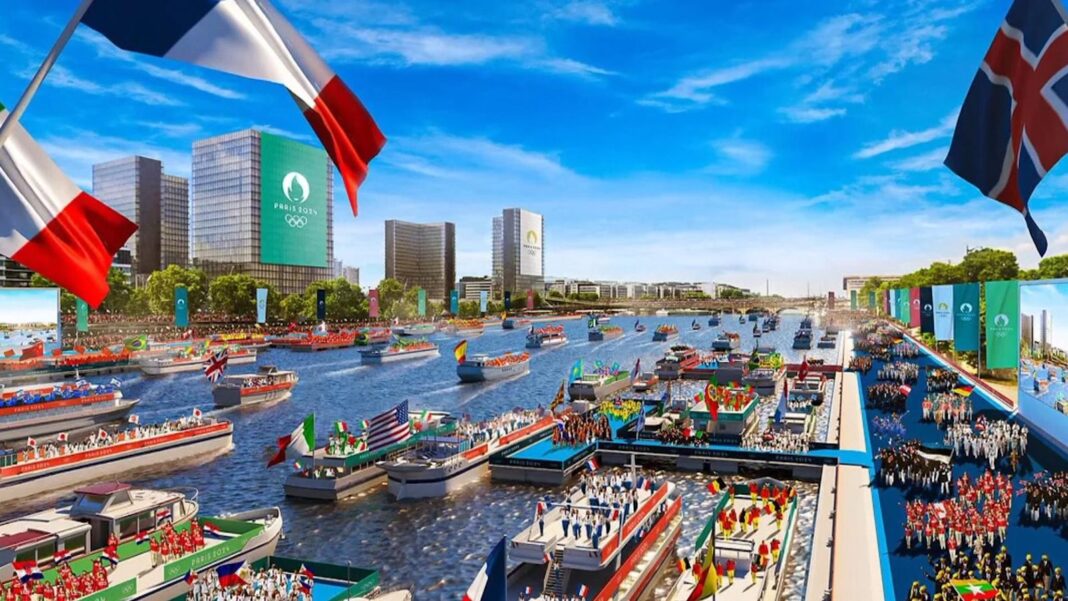The countdown to the Paris 2024 Olympics is on.
The Olympic torch was lit in an official ceremony in ancient Olympia on Tuesday, the start of a relay across Greece and France that will end in Paris for the start of the Games on 26 July.
The Olympics will take place from 26 July to 11 August and the Paralympics will run from 28 August to 8 September.
Consider this your ultimate guide to the Games – everything you need to know, updated as the opening ceremony approaches.
What happens when the torch is lit?
The torch was lit at the spot originally used for the Olympic Games by the ancient Greeks before being passed to the first torchbearer.
There began an 11-day relay in Greece before the torch travels to France on board a three-masted ship, the Belem.
The French leg of the relay begins in Marseille, where the sailing competitions will be hosted.
A total of 10,000 torchbearers will carry the flame across the 64 territories of France on its way to the capital city, where the torch will light the Olympic flame, officially starting the Games.
The Olympic torch is lit at a ceremony in Greece. Pic: Reuters
What is planned for the opening ceremony?
The plan has been billed as “an opening ceremony like no other”: 10,500 athletes, 160 boats, a 3.7-mile route along the River Seine.
It is expected 1 billion people will watch the event around the world and 326,000 will be there in person – a downsizing of the planned 600,000 on security grounds.
The 26 July event is set to be the first Olympic opening ceremony held outside a stadium setting.
The parade will end at the Trocadero square, facing the Eiffel Tower.
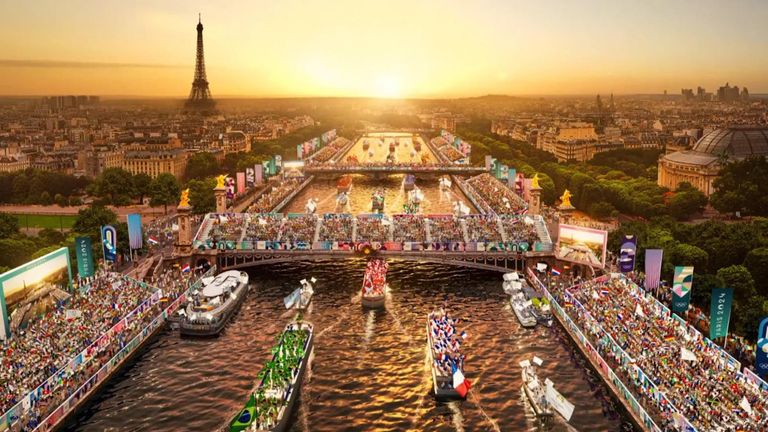
The opening ceremony is expected to end at the Eiffel Tower. Pic: Paris 2024
However, the best laid of plans may be upset by security threats.
President Emmanuel Macron has admitted the ceremony could be scaled down if the security threat is deemed too high.
There are “plan Bs, and even plan Cs”, the French leader said. That could look like confining the event to the Trocadero – scrapping the river parade – or moving it indoors to the Stade de France.
Problems with the Seine
The opening ceremony isn’t the only Seine-related headache France is dealing with.
The triathlon could be delayed, or the swimming leg cancelled altogether, due to poor water quality levels.
Heavy rain could raise levels of E. coli in the water, making it unsafe to swim.
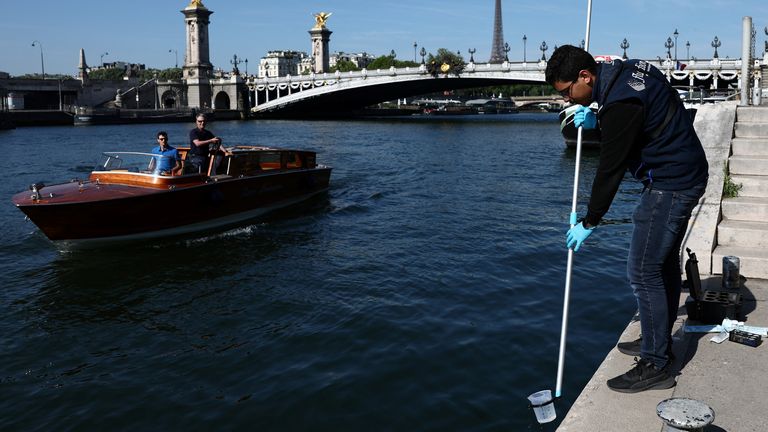
Testing of the River Seine found E coli and faecal matter. Pic: Reuters
The Surfrider Foundation Europe charity warned in April that samples from the Seine showed dangerous levels of bacteria in the water.
After finding evidence of E. coli, enterococci, intestinal bacteria and “formidable indicators of pollution of faecal origin”, the charity said athletes swimming in the water will be “taking significant risks to their health”.
Paris mayor Anne Hidalgo and Mr Macron have promised to take a dip in the river before the start of the Games to demonstrate it is safe.
The new sport at the Games
Breaking – also known as breakdancing – will make its debut as an Olympic sport in Paris.
Breaking athletes are known as B-Boys and B-Girls. The competition will feature 16 B-Boys and 16 B-Girls who will face off one on one.
They will be judged on five categories: musicality, vocabulary, originality, technique and execution.
Breaking joins other recently established “urban” sports including skateboarding, surfing, sport climbing and BMXing.
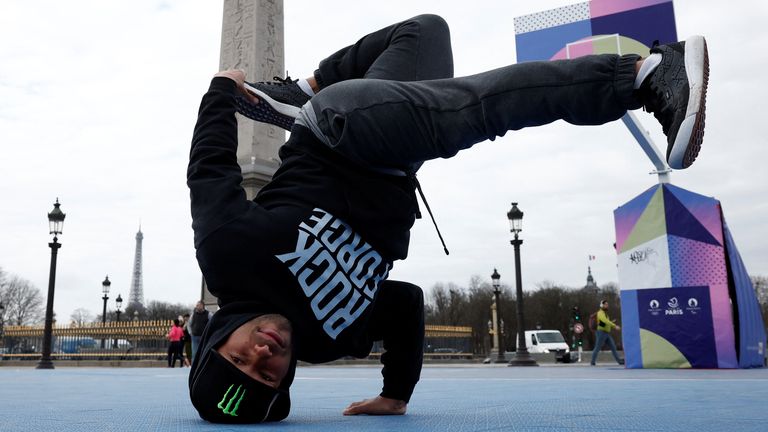
Pic: Reuters
Games in a time of war
Russian and Belarusian athletes will be allowed to compete despite the ongoing war in Ukraine – but they will do so as neutral athletes.
That means they will not not be allowed to parade in the opening ceremony and will not have their national anthems played, or their national flags raised, if they win medals.
This decision from the International Olympic Committee (IOC) has angered Moscow.
Mr Macron has also said Russia would be asked to observe a ceasefire in Ukraine during the Games.
Suspending armed conflicts under an Olympic truce during the Games was a standard practice in ancient Greece.
However, the Kremlin said Ukraine might use a ceasefire as an opportunity to regroup and rearm.
Some Palestinian activists and a group of 26 French politicians called for Israel to be banned from the Games over the war in Gaza, but the IOC said it had no plans to sanction Israel.
How is Paris preparing for the Games?
Seine-Saint-Denis, in the northeast of the capital, is the home of the Olympic Village, which will house 9,000 athletes.
The size of 70 football pitches, the village is split by the River Seine with a bridge to link the accommodation blocks.
After the Games, the village will be turned into homes for 6,000 people and offices for 6,000 workers.
More than half of the structures being built or renovated for the Games are in Seine-Saint-Denis, mainland France’s poorest region.
While it’s hoped the Games will leave a legacy of new and refurbished sports infrastructure in the suburb, dozens of squats were cleared in 2023 in what advocates said appeared to be a policy aimed at beautifying the area.
Please use Chrome browser for a more accessible video player
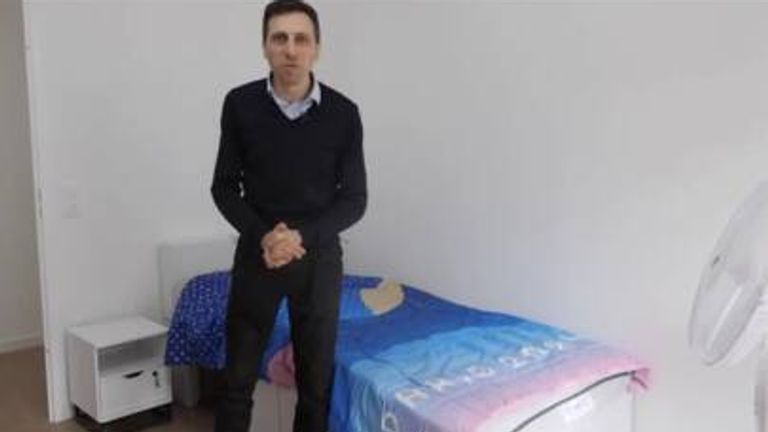
0:59
Inside the Olympic Village
Transport preparations are also under scrutiny. The price of metro tickets will almost double during the Games, from €2.10 (£1.80) to €4 (£3.40).
The city’s mayor Anne Hidalgo and the region’s president Valerie Pecresse have been at odds over whether the capital’s transport system will be ready for the influx of tourists.
Ms Pecresse – whose regional council is in charge of transport – said the price hike would cover the “dramatic” increase in transport, while the mayor has said there won’t be enough trains.
Ms Hidalgo also said the situation for the city’s homeless was another major issue.
“I don’t want to take them out and hide them (during the Olympics). There should be a social legacy,” she said.
France was accused of trying to “hide poverty” ahead of the Games, with police reportedly evicting homeless people from makeshift camps.
A shanty town next to Bordeaux’s football stadium was also cleared according to the report by a collection of charities, which said cities were being subject to “social cleansing”. French authorities denied the accusations.
Will Notre-Dame reopen in time for the Games?
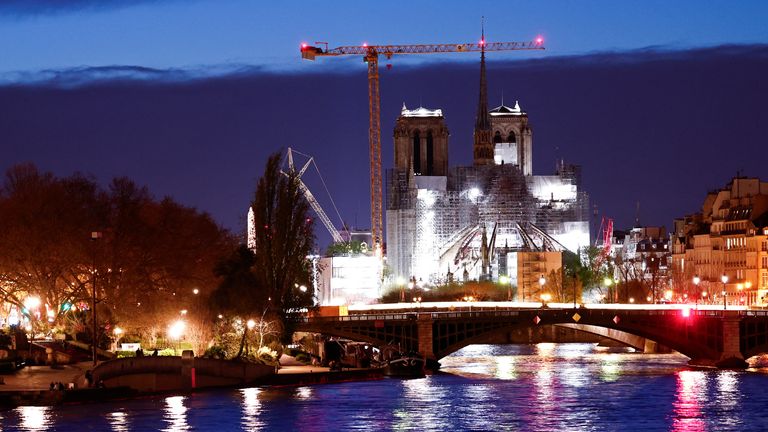
Five years after the fire at Notre-Dame, the church spire is now visible. Pic: Reuters
In a city of landmarks, Notre-Dame is one of the most famous, the cathedral’s twin bell towers rising above the Seine.
It has been closed to the public for five years after a devastating fire ripped through the building, toppling the spire.
President Macron declared after the April 2019 blaze that he would rebuild the church within five years – a pledge many treated with scepticism.
While the cathedral will not be open to the public in time for the Olympics – the reopening is scheduled for December – the scaffolding has now been removed to reveal the new spire.
What about bedbugs?
Last autumn, Paris was in the grip of a bedbug crisis – although experts said the problem was just as bad in London.
Emmanuel Gregoire, first deputy mayor of Paris, called on Prime Minister Elizabeth Borne to act on the “scourge” before the Olympics.
“Bed bugs are a public health problem and should be reported as such,” he wrote to her.
“The state must urgently bring together all concerned in order to enact an action plan appropriate with this scourge as all of France prepares to host the Olympic and Paralympic Games in 2024.”
After the initial panic, authorities said there was no trace of any unusual outbreak.
In March, a French minister claimed the bedbug scare was artificially amplified by social media accounts linked to Russian “disinformation” activities.


